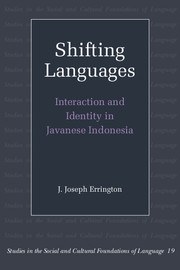Book contents
- Frontmatter
- Contents
- List of figures, maps, and tables
- Acknowledgements
- Preface: suggestions for use
- Note on orthography and transcription
- Map 1 The Indonesian archipelago
- Map 2 Eastern Central Java
- 1 Introduction
- 2 A city, two hamlets, and the state
- 3 Speech styles, hierarchy, and community
- 4 National development, national language
- 5 Public language and authority
- 6 Interactional and referential identities
- 7 Language contact and language salad
- 8 Speech modeling
- 9 Shifting styles and modeling thought
- 10 Javanese–Indonesian code switching
- 11 Shifting perspectives
- Notes
- Works cited
- Index of javanese and indonesian words
- General index
- Titles in the series
1 - Introduction
Published online by Cambridge University Press: 01 June 2011
- Frontmatter
- Contents
- List of figures, maps, and tables
- Acknowledgements
- Preface: suggestions for use
- Note on orthography and transcription
- Map 1 The Indonesian archipelago
- Map 2 Eastern Central Java
- 1 Introduction
- 2 A city, two hamlets, and the state
- 3 Speech styles, hierarchy, and community
- 4 National development, national language
- 5 Public language and authority
- 6 Interactional and referential identities
- 7 Language contact and language salad
- 8 Speech modeling
- 9 Shifting styles and modeling thought
- 10 Javanese–Indonesian code switching
- 11 Shifting perspectives
- Notes
- Works cited
- Index of javanese and indonesian words
- General index
- Titles in the series
Summary
In 1995, in the afterglow of the Asia Pacific Economic Conference (APEC) which it had hosted the previous year, Indonesia celebrated its fiftieth anniversary as a newly visible power on the international scene. Some believed Indonesia came of age twice then, at a doubly vindicating moment for the regime which had overseen its conspicuously successful thirty-year project of nation-building. Since 1965, the quasi-military New Order state had progressively centralized its political control and implemented an uncontested, long-term project of national development. Under its supervision a Western-educated, technocratic elite had successfully engineered the macrodevelopment which has gained Indonesia newfound stature on the world scene.
From Jakarta, the national capital and nexus of political and economic power, the New Order had progressively spread and deepened its oversight across the Indonesian archipelago. Communities once at the peripheries of the state's jurisdiction, and hardly touched by state institutions, are increasingly engaged with the ideology of nationalism and modernity which it propagates. As state institutions increasingly impinge on everyday life, ideas of modernity, national identities, and obligations of citizenship are increasingly salient in communities which only recently were loosely integrated into the national polity.
The New Order can be seen as fostering a native sense of Indonesianness by “ethnicizing” the Indonesian polity, yet simultaneously working to avoid overtly effacing antecedent ethnolinguistic diversity, or promoting the ascendance of any “native” subnational group. But in fact there is one ethnic group, the Javanese, which looms very large on the national landscape.
- Type
- Chapter
- Information
- Shifting Languages , pp. 1 - 15Publisher: Cambridge University PressPrint publication year: 1998

